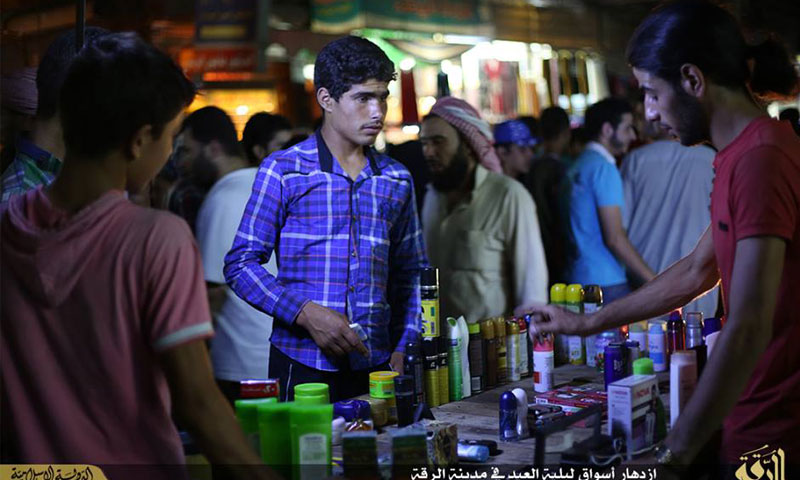The “Islamic State” has always been rigorous in implementing their administrative procedures in Raqqah city, its main stronghold in Syria. However, the group has begun neglecting to implement regulations concerning public maintenance in the city and tightening its military and security hold on the city in anticipation of the expected offensive on the city from its northern rural region.
Three years after the “Islamic State” gained control of Raqqah in the middle of February 2014, it was chosen as the “capital of the Caliphate”. Six months later, the “Islamic State” has instituted a series of “unjust policies”, as residents of the city describe them. Enab Baladi examines the reality of life within the city and its impact on civilians today.
“Islamic State” Conduct Changes Making Residents Fearful
“There is a massive difference between the Islamic State that arrived three years ago and the Islamic State today,” said Farouk, a young resident of al-Mashleb neighborhood. He explained that things have changed noticeably including ordinary people’s behavior although, on the surface, things appear unchanged.
Farouk confirmed that today the city witnesses many raids and campaigns to arrest people, and an increase in the number of random checkpoints, which search passersby for no reason. He explained that formerly administrative and legal procedures imposed “harsh” fines on anyone who violated the law, most of them concerning the general appearance of the city and its streets. Those laws and regulations asserted the “prestige of the Islamic State”, as Farouk describes it, despite residents’ objections to some of them. “But they served as a check on actions such as theft, fraud, kidnapping or embezzlement of property or money, which the local community needed.”
Chaos or the Islamic State
Farouk’s stories were supported by those of other residents. Many residents consider the Islamic State “the lesser evil” in the face of chaos, although they object to its actions and restrictions. They fear chaos and displacement if fighting comes close to the city.
However, many disagree and wish to be rid of the Islamic State by any means possible as Mohammad, a shop owner in Raqqah, explained, “The Islamic State members corrupted people, violated their property and destroyed everything,” adding in the local dialect, “There’s nothing left for us to fear, let us be done with it.”
Fear of the Return of Thefts and Kidnapping
Most of the people Enab Baladi spoke to expressed fears that instances of theft and kidnapping would return to the city and rural areas under Islamic State control. At the same time, they face a deterioration in services (transport and communications) within the city, although they are under the Islamic State’s management. They also complained that the Islamic State is no longer ensuring traders and salesmen respect the rules, giving them free rein and leading to a rise in prices.
Omar, who is originally from Deir el-Zor and has been living in Raqqah for three years, said that what people fear is the worsening of conditions in the coming days and weeks, especially with the Islamic State’s engagement in battles on multiple fronts and its neglect of civilians whose numbers are increasing in light of the latest migration waves from areas within Syria and Iraq.
Managing the city and providing its population with services has always been a major part of the Islamic State’s activities. It sought to project its status as a state or government by regularly publishing photos showcasing its management of the city. However, standards have noticeably and continuously deteriorated, with electricity going out for many hours on a daily basis and water always unavailable, in addition to deterioration in overall health conditions in the city.
According to Omar, the city’s streets have become dirty, while they used to be decorated by the Islamic State and the pavements repainted as part of their administrative work. The group is digging trenches on the sides of streets and its members collect and burn car tires to confuse warplanes and cover some of the city’s streets with tarpaulin.
Some residents of Raqqah, amongst them the young Mohammad who lives in Basel Street, believe that the Islamic State was previously interested only in carrying out the local census and identifying property and shop owners. Many now fear that this will lead to greater restrictions on residents. Mohammad told Enab Baladi that there is talk in the city of some residents being forced to leave their houses, which increases the number of victims and destroys the city even more.
No one can predict the future of Raqqah despite the American media’s announcement of the mobilization of 40,000 fighters for an impending battle to “liberate” the city. Meanwhile, the Democratic Syrian Forces are continuing their preparations for battle and Turkey has announced its intention to participate in the battle subject to certain conditions. Raqqah’s fate remains unknown in light of the battle for Mosul.
Commentators argue that the battle over the largest of Iraq’s cities will undoubtedly shape what is happening in Syria. It may well push many of the Islamic State’s fighters in Iraq to move their headquarters to areas under Islamic State control in Syria, chief amongst them Raqqah, which may turn into a battleground. Few military experts expect that the operation to expel Islamic State forces from Raqqah will be easy or quick, indicating that the battle may last for months, leaving behind widespread destruction.
